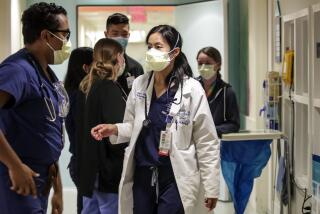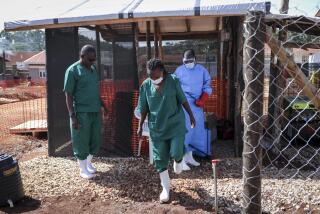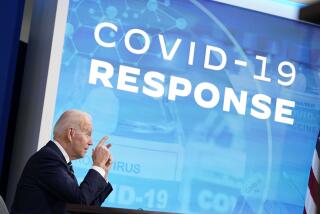Obama urges praise for U.S. health workers fighting Ebola
Reporting from WASHINGTON — President Obama urged Americans on Tuesday to set aside their fears of Ebola and make sure that U.S. healthcare workers who go to West Africa are “applauded, thanked and supported” when they return home.
If those workers successfully fight the deadly virus at the source of the outbreak, he said, “we don’t have to worry about it” in the United States.
“They are doing God’s work over there, and they are doing that to keep us safe,” Obama said after days of back-and-forth between federal and state officials over the prudence of quarantining returning aid workers.
In a statement scheduled at the last minute, the president spoke of the aid workers’ heroics and defended his administration’s response to the largest Ebola outbreak in history, which has included guidelines for returning medical volunteers that are less stringent than the quarantines some states have instituted.
Obama called the new federal protocols “sensible, based in science and tailored to the unique circumstances of each health worker.”
The administration’s top scientists have said that quarantining all returning healthcare workers will discourage them from going to West Africa, and thus further the spread of the deadly virus. The World Health Organization estimates that Ebola has killed more than 4,900 people, almost all of them in West Africa, since December.
Obama spoke by telephone Tuesday with some of the volunteers who are in West Africa fighting the Ebola epidemic and planned to meet with returning aid workers Wednesday.
He said he also talked with Amber Vinson, one of two Dallas nurses who contracted the disease after treating Thomas Eric Duncan, a Liberian who was the first Ebola patient diagnosed in the United States. Vinson has been declared virus-free and was released from the hospital Tuesday.
Last week, Obama met with Nina Pham, the other nurse who was sickened after caring for Duncan and who has also recovered.
The meetings give Obama a chance to thank the health workers but also to visually reinforce his administration’s message that they should be treated as heroes, not pariahs.
“America cannot look like it is shying away because other people are watching what we do, and if we don’t have a robust international response in West Africa, then we are actually endangering ourselves here back home,” he said.
Under the looser guidelines issued Monday by the U.S. Centers for Disease Control and Prevention, healthcare workers returning from the three countries at the heart of the outbreak — Liberia, Sierra Leone and Guinea — will be asked to let local public health officials monitor them. If they fall into a high-risk group, they will be asked to stay home until it is clear they do not have the disease.
State and local officials are free to implement their own quarantine rules, however.
Defense Secretary Chuck Hagel is considering a three-week quarantine for all U.S. troops returning from the Ebola support mission in West Africa after receiving that recommendation Tuesday from the Joint Chiefs of Staff. Twenty-one days is the longest known incubation period for Ebola.
Gen. Martin E. Dempsey, chairman of the Joint Chiefs, recommended “a regimented program of 21 days of controlled, supervised monitoring,” said Pentagon spokesman Rear Adm. John Kirby.
The proposal, envisioned as a precautionary measure, is a departure from the guidelines the administration issued for returning medical volunteers. But Obama said that because military personnel were not treating patients and were not in West Africa voluntarily, “we don’t expect to have similar rules for our military as we do for our civilians.”
The first group of U.S. military personnel that came back from Liberia was quarantined over the weekend. Army Maj. Gen. Darryl A. Williams, commander of U.S. Army Africa, and 11 other soldiers were confined at a U.S. military installation at Vicenza, Italy.
Williams arrived in Liberia last month to form an advance team in West Africa before another commander formally took over Sunday.
“This was done out of an abundance of caution, to be prudent, and because this was the first installment of troops to come back,” Kirby said. “We’ll see whether this is the right protocol moving forward for everybody.”
Up to 4,000 troops could be deployed to West Africa to deal with the spread of Ebola, the Pentagon has said.
More than 1,000 U.S. military personnel are in Senegal and Liberia, the country hardest-hit by the disease. Troops are training healthcare workers, setting up infrastructure, processing test samples and airlifting materials.
Dempsey’s recommendation for all military personnel came a day after Army Chief of Staff Gen. Ray Odierno issued a directive that Army personnel involved in the Ebola mission in West Africa must be quarantined for three weeks before redeploying elsewhere.
More to Read
Sign up for Essential California
The most important California stories and recommendations in your inbox every morning.
You may occasionally receive promotional content from the Los Angeles Times.












